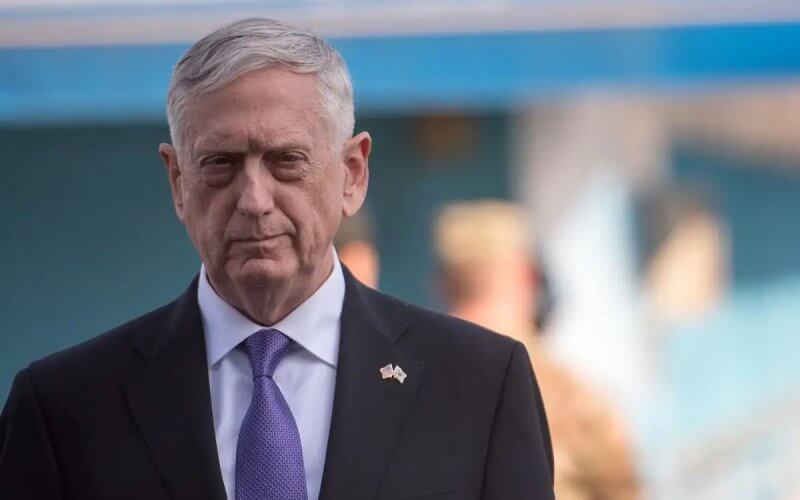On Tuesday, a new report revealed that retired United States Marine General James (Jim) Mattis served as a military adviser for the United Arab Emirates (UAE) Sheikh Mohamed bin Zayed al-Nahyan (MBZ) following the 2015 Saudi-UAE coalition war against the Islamic Republic of Iran-backed Houthi terrorists.
MBZ, who served as the deputy supreme commander of the Emirati military, reportedly needed assistance from the former retired U.S. General as the conflict began to prolong and the coalition's bombing campaign began to face scrutiny for the large number of civilian deaths. Mattis applied in June 2015 for permission from the Marines and the State Department to advise Mohamed and the UAE on "the operational, tactical, informational, and ethical aspects" of the war in Yemen, according to a report by the Washington Post.
After the bombing campaign began, then President Obama and his administration agreed to support the Arab coalition's air forces with aerial refueling and intelligence. Officials, however, started to grow concerned by the number of innocent Yemenis dying in coalition airstrikes.
Government officials quickly approved Mattis' request, concealing his advisory role in Yemen and his work for MBZ. The former Marine General did not publicly reveal his consulting job for the UAE upon returning to the Pentagon in January 2017 to become U.S. Secretary of Defense for the Trump administration. Mattis excluded his public work history and financial disclosure forms he filed with the Office of Government Ethics but reported it confidentially to the Senate Armed Services Committee.
This latest report “discredits relationships with countries from the Arab Gulf,” Eric James Bordenkircher, research fellow at UCLA's Center for Middle East Development told The Foreign Desk. It also “discredits former President Trump's judgment regarding political appointees,” he said.
Mattis did not mention his activities in his 2019 memoir, and various senators said the former Marine General did not inform him of his activities.
Documents obtained by the Washington Post state that the UAE would compensate Mattis for his advice and award him a $100,000 honorarium for giving one speech after he left the Trump administration. A spokesman for the retired general said he worked for free.
In March, upon the UAE joining the Saudi-led coalition in Yemen, MBZ contacted Mattis to ask if he would work as a consultant for Dubai. In his federal application for foreign government employment, Mattis explained that he advised the Persian Gulf monarch on the war in Yemen. He did not elaborate on how much time he would devote to the job or how deeply he would become involved in the ongoing conflict.
"My duties would include reviewing the UAE's military situation, focused initially on the Yemen campaign, with the purpose of providing military advice," Mattis wrote in June 2015."
"The purpose of this position is to bring American military experience in war-fighting and campaigning to bear in terms of strengthening UAE's efforts," he stated.
The former Marine General stated that he would be "compensated" according to the Foreign Government Employment Questionnaire he submitted to the Marine Corps June 4, 2015, in his application to work for the UAE. Mattis stated that he was negotiating details of his pay package with UAE officials.
In response to the recent revelations, Robert Tyrer, co-president of the Cohen Group, a Washington consulting firm where Mattis is a senior counselor, told The Washington Post that the UAE did not pay Mattis for his work on advising MBZ.
According to Tyrer, Mattis had a "longstanding policy" of not accepting money from foreign officials. "He has never requested nor received any compensation from any foreign government at any time," Tyrer told The Washington Post. Asked about the discrepancy with what Mattis wrote on his application, Tyrer said the former Marine General never expected to be paid but stated on his form that he would be because he wanted his application to receive extra scrutiny to ensure everything was legal.
Mattis' application went through the Marines' chain of command, receiving preliminary approval on June 19, 2015. The Marine Corps passed the paperwork to the State Department, where the Bureau of Political-Military Affairs gave final approval on Aug 5, 2015.
Months after applying for federal permission to work for the UAE, Mattis received another job offer: to serve in the administration of President-elect Donald Trump. After leaving the Trump administration over Trump’s decision to withdraw American troops from Syria and halve the number of American forces in Afghanistan, Mattis applied for federal approval to accept employment from the Emirati government, serving as a featured speaker at a conference on American-UAE relations hosted by MBZ in Abu Dhabi.
In his application, Mattis stated that the UAE would pay him an "honorarium" while covering his travel expenses. Mattis responded to a question about being compensated for his speech in Abu Dhabi, writing: "Yes, standard honorarium for all presenters of this lecture series is $100K plus Airfare & Lodging Reimbursement." Tyrer said that at the end of the day, the former Marine General did not receive payment for the speech and only "listed the standard honoraria figure that is commonly offered to participants," so his application would receive a "rigorous" review like many others.
"U.S. relations with countries from the Arab Gulf receive considerable scrutiny, particularly from progressives, because their values and monarchical system of governance stand in stark contrast to American values and democracy," Bordenkircher explained. Despite the former Marine General's assistance with the UAE and its efforts in Yemen, the Biden administration has stopped providing the Saudi coalition with arms, effectively ending the war in Yemen and allowing the Iranian-backed Houthis to rule the country and expand the Islamic Revolution.
"The problem with the constant scrutiny, discrediting, and calls to 'reset' these relations is: If we concede to these calls and demands, who will be left to do America's bidding in the Middle East? The UAE remains a valuable ally in combating Iranian ascendancy in the region and Iran's attempt to achieve nuclear capabilities. U.S. support of the UAE in Yemen and Mattis' assistance is a component of countering the Iranian threat," Bordenkircher told The Foreign Desk.










